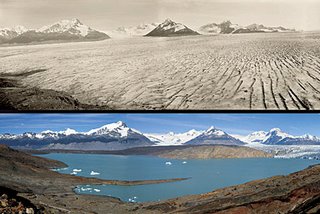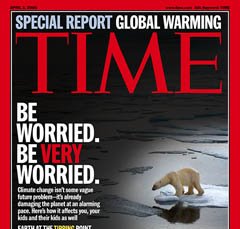Next stop, Mars

For the first time since 1972, the United States is planning to fly to the moon, but instead of a quick, Apollo-like visit, astronauts intend to build a permanent base and live there while they prepare what may be the most ambitious undertaking in history -- putting human beings on Mars.

I'm not saying its not a fascinating idea to go to Mars, or that we shouldn't do it. To the contrary, I imagine a program to do something like that would generate incredible new technologies, and significantly advance many scientific disciplines. But, shouldn't the first priorty be addressing (which begins with acknowledging the existence of) global warming, and the concomitant threats of rising oceans, drowning polar bears, and further coastline devastation around the world? Or rebuilding and planning long-term for protection of American coastal areas from increasingly-elevated sea levels? Why is *this* national security issue ignored, denied, and downplayed?
Dumping that much water into the ocean is a very dangerous thing. Icebergs don't raise sea levels when they melt because they're floating, which means they have displaced all the water they're ever going to. But ice on land, like Greenland's, is a different matter. Pour that into oceans that are already rising (because warm water expands), and you deluge shorelines. By some estimates, the entire Greenland ice sheet would be enough to raise global sea levels 23 ft., swallowing up large parts of coastal Florida and most of Bangladesh. The Antarctic holds enough ice to raise sea levels more than 215 ft.(emphasis added).
. . .
Ocean waters have warmed by a full degree Fahrenheit since 1970, and warmer water is like rocket fuel for typhoons and hurricanes. Two studies last year found that in the past 35 years the number of Category 4 and 5 hurricanes worldwide has doubled while the wind speed and duration of all hurricanes has jumped 50%. Since atmospheric heat is not choosy about the water it warms, tropical storms could start turning up in some decidedly nontropical laces. "There's a school of thought that sea surface temperatures are warming up toward Canada," says Greg Holland, senior scientist for NCAR in Boulder. "If so, you're likely to get tropical cyclones there, but we honestly don't know."
. . . Many environmentalists declared the Bush Administration hopeless from the start, and while that may have been premature, it's undeniable that the White House's environmental record--from the abandonment of Kyoto to the President's broken campaign pledge to control carbon output to the relaxation of
emission standards--has been dismal. George W. Bush's recent rhetorical nods to America's oil addiction and his praise of such alternative fuel sources as switchgrass have yet to be followed by real initiatives.
The anger surrounding all that exploded recently when NASA researcher Jim Hansen, director of the Goddard Institute for Space Studies and a longtime leader in climate-change research, complained that he had been harassed by White House appointees as he tried to sound the global-warming alarm. "The way democracy is supposed to work, the presumption is that the public is well informed," he told TIME. "They're trying to deny the science." Up against such resistance, many environmental groups have resolved simply to wait out this Administration and hope for something better in 2009. . .

0 Comments:
Post a Comment
<< Home